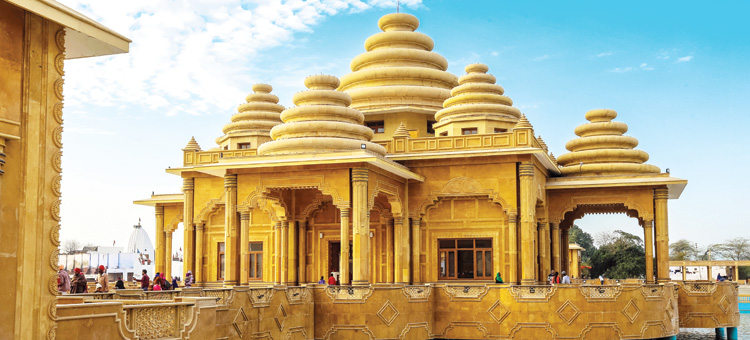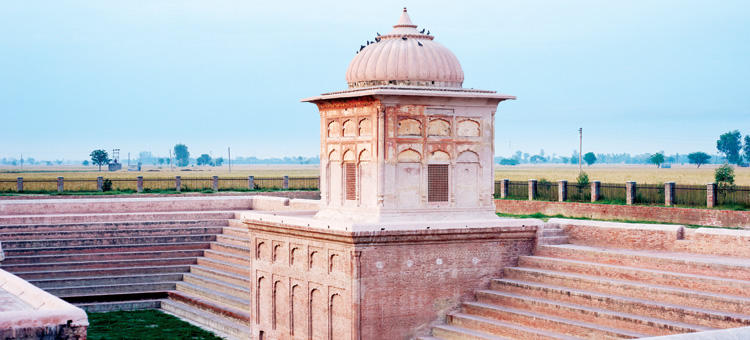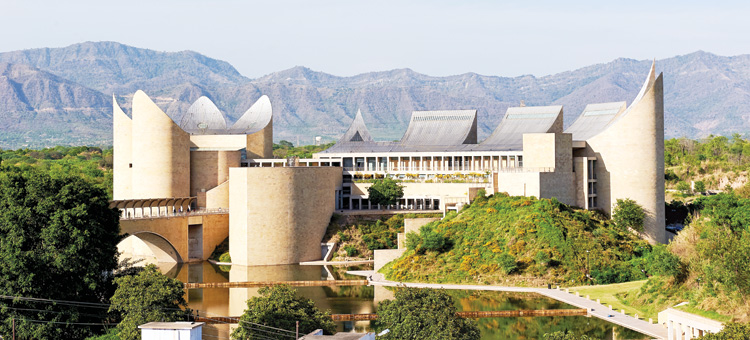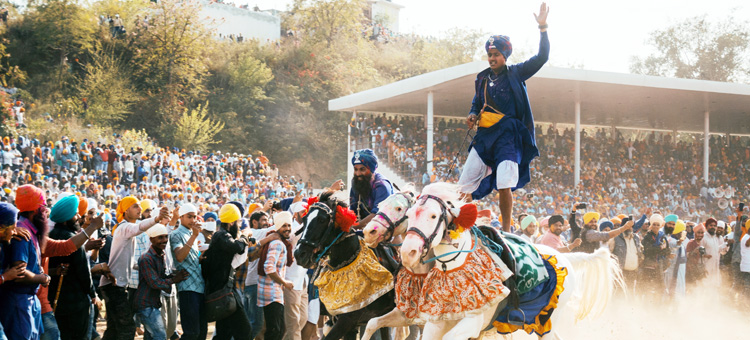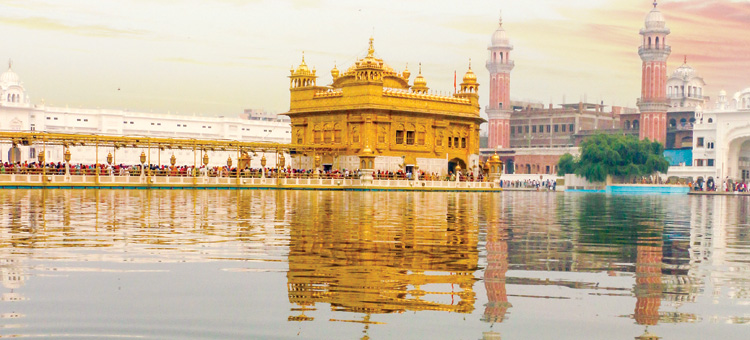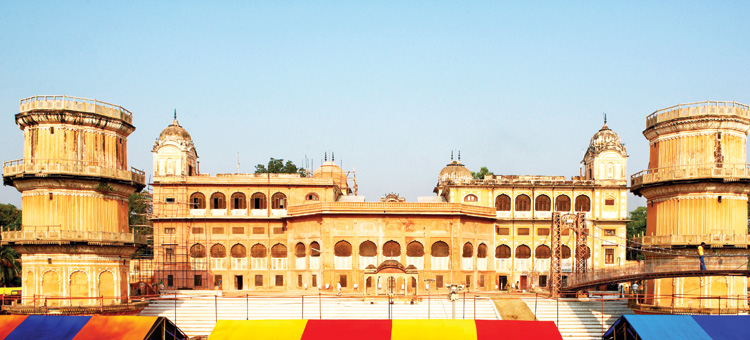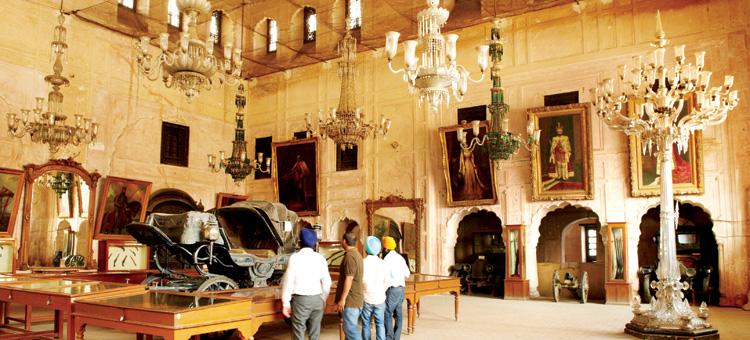Amritsar: The Granary of India and the land of five rivers, Punjab is not a destination that is on top of a leisure tourist’s mind today. But all that can change if the government’s renewed interest in developing tourism infrastructure and driving promotions come to fruition.
With a high profile cricketer turned politician as the tourism minister, Punjab Tourism is on mission mode and securing ample coverage in newsprint. The State, renowned for its gurudwaras, forts and palaces, battlefields from the British era, delicious food, bouncy Bhangra beats and joyful people, has all it takes to be a destination of choice.
In 2017, a total of 11.08 lakh foreign tourist arrivals (FTAs) were recorded in the State (national rank 7), as against 6.59 lakh in 2016, while the number of domestic tourist visits stood at 4.02 crore (national rank 11) as against 3.87 crore in 2016 when it was ranked nationally as 11th in FTAs and 10th in domestic tourists.
A major contributor to footfalls in the State is the Golden Temple in Amritsar which pulls in 1.25 lakh visitors a day – more than the iconic Taj Mahal! The other two major attractions are the Wagah Border where the Pakistani Rangers and India’s Border Security Force (BSF) personnel engage in the Beating the Retreat ceremony, and Jallianwalah Bagh, which houses a memorial of national importance built in 1951 to commemorate the dastardly massacre of innocent unarmed civilians by the occupying British forces on Baisakhi (Punjabi New Year) day in 1919.
The tourism tagline of Punjab goes ‘India Begins Here’ and the same is true in more ways than one. In early 2018, the State notified its first cultural Policy and revised the Tourism Policy with an aim to promote heritage & culture and tourism in the State. The State government is giving special emphasis and providing incentives to investors for the development and promotion of tourism. Punjab has taken a big leap in FTAs and is now ranked 7th in the country.
Aiming to double tourist arrivals in the State in the next five years, the Amarinder Singh government in Punjab is planning to promote several thematic circuits including Amritsar Circuit, Mughal Circuit, Maharajah Circuit and Religious Circuit. Agri-tours (Farm Tourism) is another segment the government is focussing on. The DoT has shortlisted 38 farm stay providers across the State, each offering 2 to 6 rooms.
Punjab State Tourism Policy 2018, which replaced the earlier policy dated 2003, also plans to provide impetus to rural tourism, medical tourism, heritage tourism and film tourism.
Amritsar will continue to remain the jewel in the crown, the trump card of Punjab Tourism. A Rs. 125 crore proposal for Amritsar prepared under PRASAD Scheme has been submitted to the Central Government and is awaiting sanction. Punjab’s Tourism Minister Navjot Singh Sidhu has announced that 30 destinations with high potential across Punjab have been chosen to be developed into world-class tourism spots.
“The government plans to spend a whopping Rs. 590.97 crore on this project. In Amritsar alone, around 11 spots will be spruced up to attract more tourists.” Minister Sidhu also said that the pre-determined timeline for these developmental projects will be two years. “Tourism will be the driving force behind Punjab’s economic growth and the State government is striving to ensure that tourism contributes at least 20 per cent to the State’s GDP.”
Of the sites chosen under the new tourism initiative, places such as Amritsar’s Heritage Street, Gobindgarh Fort, Wagah Border, Jallianwala Bagh, War Memorial, Partition Museum, Pul Moran and Maharaja Ranjit Singh Summer Palace are top priority. The ministry will give special attention to develop and promote Ropar town which is the site where the agreement between Maharaja Ranjit Singh and Lord William Bentick was signed, and other places like Patti Fort, Virasat-E-Khalsa in Sri Anandpur Sahib, Sheesh Mahal, Patiala, Arms & Chandelier Gallery (Qila Mubarak), Patiala and Bahadurgarh Fort, Patiala.
In July 2018, a blueprint to develop Virasat-e-Khalsa, a museum of the Sikhs, as a ‘strategic tourist spot’ in the State besides upgrading the basic amenities and infrastructure at Sri Anandpur Sahib, the birthplace of Khalsa, was approved by Minister Sidhu. The plan involves developing tented accommodation, budget hotels, food courts and souvenir shops in its vicinity. Of the Rs. 99 crore sanctioned under the Swadesh Darshan Scheme by the Union Ministry of Tourism, Rs. 29 crore has been earmarked for Sri Anandpur Sahib.
The government is also exploring the possibility of connecting Sri Anandpur Sahib with Naina Devi in Himachal Pradesh by ropeway, which would further enhance the tourism potential of the region. In this regard, an MoU has been signed by the governments.
To create a uniform façade for the holy city of Sri Anandpur Sahib on the lines of the Golden Temple in Amritsar, the Department of Tourism (DoT) is chalking out a detailed plan to ensure uniformity of all the buildings, shops and establishments in a holistic manner.
A plan to create one to five-day itineraries covering 18 select tourist destinations of Punjab has been mooted by the DoT. State War Heroes’ Memorial-cum-Museum, Golden Temple, Jallianwala Bagh, Heritage Street, Partition Museum, Durgiana Temple, Gobindgarh Fort, Maharaja Ranjit Singh Summer Palace, Pul Moran, Wagah Border, Tarn Taran’s Harike Pattan, Kapurthala’s Durbar Hall and Moorish Mosque, Science City, Jang-e-Aazadi Museum and SBS Nagar’s Khatkar Kalan Village (Shaheed Bhagat Singh’s Village) have made the cut. The DoT is sprucing up these destinations with world class tourism infrastructure including landscaping, renovating the ailing monuments and providing tourist amenities like toilets and washrooms, F&B outlets and parking facilities.
“Today more than 70 per cent of all tourist footfalls hitting the State is thanks to the Golden Temple. But we don’t want tourists to just come to the Golden Temple and return. There is so much more to see in Amritsar and the rest of Punjab,” says Malwinder Singh Jaggi IAS, Director, Punjab Tourism. “Short tours do not benefit the local community. Longer stays by tourists mean more business for the industry and helps us generate foreign exchange and provide jobs.”
There is also a plan to convert Amritsar’s Town Hall into a food street akin to Lahore’s food street where Amritsar’s 146 delicacies, including Ram Laddu, Kuje di Lassi, Jalebi and Kahne Diyan Purian, will be offered to domestic and international tourists.
However, a similar project, Punjab’s first night food street, Urban Haat, set up on the lines of Lahore’s famous food street, is yet to be considered a success. Some of these development and renovation projects are funded by the Asian Development Bank (ADB). Of the Rs. 590.97 crore outlay planned, Rs. 344 crore is a loan from ADB. A Rs. 100 crore project has been prepared for developing a Mughal Circuit involving sites connected to the Mughal era. Maharaja Circuit, is another Rs. 100 crore project which will see sites connected to the erstwhile princely states getting a facelift. Both project reports have been sent to the MoT and is awaiting sanction.
“Rs. 250 crore from the ADB loan has already been spent,” informs Director Jaggi. “This has been incurred towards conserving heritage buildings and creating new projects like the Heritage Walk in Amritsar from the Townhall to the Golden Temple.”
2019 is the centenary year of the Jallianwalah Bagh massacre. The DoT has major plans to commemorate this historic milestone. The site is being developed at a feverish pace and new tourist infrastructure will include a Light & Sound Show and a Virtual Reality presentation.
The DoT powered by a new State Tourism Policy and a dynamic minister is going all out to change the course of Punjab Tourism – from over-reliance on religious tourism to one that is equally footed in other segments like farm tourism and culture & heritage tourism.
Accommodation
Many major hospitality brands are already in Punjab. In Amritsar, top lining the accommodations sector are Taj Swarna, Radisson Blu, Hyatt Regency, Golden Sarovar Portico, Holiday Inn, Ramada and Fairfield by Marriott. In Ludhiana, City Heart Sarovar Portico, Park Plaza, Hyatt Regency and Radisson Blu have spectacular properties for discerning travellers. The shared capital city of Chandigarh features Taj, Hyatt Regency, JW Marriott, The LaLiT, The Oberoi Sukhvilas Resort & Spa and ITC WelcomHotel Bella Vista, among many others. These apart, there are also about 100 homestays across the State ‘certified’ by the DoT.
For a Firsthand Experience of the Festivals of Punjab
Plan your travel to Punjab in 2019 around the festive seasons of Baisakhi (14 April), Diwali (27 October) or Holla Mohalla (22 March) for an enriching experience. Baisakhi or Vaisakhi marks the Sikh New Year and commemorates the formation of the Khalsa panth of warriors under Guru Gobind Singh in 1699. It is also a spring harvest festival for the Sikhs. The festival is best observed in Bathinda. Diwali is celebrated in autumn as the triumph of good over evil, light over darkness and knowledge over ignorance. Holla Mohalla, also called Hola, is a one-day Sikh festival which most often falls in March and takes place on the second day of the lunar month of Chett, a day after the Hindu spring festival of Holi but sometimes coincides with it too. The martial arts festival is best observed in Anandpur Sahib. Kila Raipur Sports Festival, popularly known as the Rural Olympics, is held annually in Kila Raipur (near Ludhiana) in February. Competitions are held for major Punjabi rural sports, including cart-race, athletic events and rope pulling.
Amritsar Craft Walk
From the Tourist Information Centre (TIC) near the Golden Temple, the Craft Walk covers nine places of interest: Tea Market, Bazaar Kathian, Bazaar Kesarian, Choora Bazaar, Pappad Bazaar, Mishri Bazaar, Herbs Market, Spice Market and Galliara.
Amritsar Heritage Walk
Starting from the Town Hall at 8 am, the Amritsar Heritage Walk ends at The Golden Temple at 10 am every day. During the winter months from December to February, the walk starts an hour late. The walk is conducted from 6 to 8 pm and in winter from 4 to 6 pm. Indian nationals have to make a contribution of Rs. 25 and foreigners Rs. 75. Tourist Information Centres of the DoT can offer all the details. The places covered are:
- Town Hall
- Gurdwara Saragarhi
- Qila Ahluwalia
- Jalebiwala Chowk
- Udasin Ashram Akhara Sangalwala
- Chitta Akhara
- Darshani Deohri
- Baba Bohar
- Thakurdwara Dariana Mal
- Chowrasti Atari
- Taksal Chowk
- Thakurdwara Raja Tej Singh
- Crawling Street: Flogging Booth
- Ancient Passage
Patiala Heritage Walk
Starting from Sahi Samadhi at 8 am, the Patiala Heritage Walk ends at Qila Mubarak at 10 am on Fridays, Saturdays and Sundays. From December to February, the walk starts an hour late. In the evening, the walk is conducted from 6 to 8 pm and in winter from 4 to 6 pm. Indian nationals have to make a contribution of Rs. 25 and foreigners Rs. 75. Tourist Information Centres of the DoT can offer all the details. The places covered are:
- Sahi Samadhi
- Pammi Puria Wala
- Haveliwala Mohalla
- Chhatta Nanumal
- Bartan Bazaar
- Darshini Deori
- Qila Mubarak
Panj Sarovar Yatra
This walk aims to introduce the story of the five important sarovars to the visitors and also give them an insight into the evolution of Sikhism. Sarovar (water tank), especially at a sacred place or by a holy shrine, is used for sacramental ablutions and other religious ceremonies. The walk begins at Sri Santokhsar Sahib Sarovar and moves along the road, passing the Gurdwara Saragarhi and Jallianwala Bagh along the way onto the narrow streets to the second stop of the walk, Sri Bibeksar Sahib Sarovar. Then just across the street is the third pit stop, Sri Ramsar Sahib Sarovar. Further on the sacred Sri Guru Granth Sahib Marg pilgrims often walk bare-foot in honour of the fifth Guru, Sri Guru Arjan Dev to reach the fourth stop on this walk the Sri Kaulsar Sahib Sarovar before making a small visit to Sri Baba Atal Sahib. Moving forward, the walk leads the pilgrims into the premises of the Sri Harmandir Sahib, passing the langar hall to Ramgarhia Bunga and then to the final and most sacred sarovar, Sri Amrit Sarovar Sahib.
More Places to See
- Wagah Border between India and Pakistan in Attari village where India’s BSF (Border Security Force) and Pakistani Rangers perform the ceremonial Beating the Retreat daily
- Jallianwalah Bagh in Amritsar
- Sadda Pind, Amritsar, is a celebration of culture as it showcases a pre-Independence Punjabi village in over 12 acres with live brick-and-stone houses of the sunar, kumhar, lohar, kissan, sarpanch, zamindar, nambardar and tangewala. Sadda Pind also offers unlimited Punjabi food
- Ram Tirath in Amritsar is believed to have been the ashram of Maharishi Valmiki, composer of the epic Ramayana. Legend also has it that Lord Rama’s wife, Sita, gave birth to their twin sons, Luv and Kush, here. Notable attractions include a hut that marks the site of their birth and beautiful statues depicting scenes from the epic. A four-day fair is held here every November.
- The Gobindgarh Fort for authentic art and crafts of Punjab. Don’t miss the light and sound show.
- The Bathinda Fort in Bathinda, a fortified structure famous for the celebrated historical romance involving Razia Sultana.
- The Sheesh Mahal of Patiala, known for its coloured glass decorations and mirror work.
- Anandpur Sahib Fort where Guru Gobind Singh started the Khalsa Movement which led to the establishment of the first Sikh empire.
- Takht Keshgarh Sahib in Anandpur Sahib, the principal shrine and holds the sword, daggers and spears of Guru Gobind Singh.
- The War Heroes’ Memorial & Museum in Amritsar pays tribute to Punjab’s brave martyrs.
- The Partition Museum in Amritsar that showcases the stories of 1947.
- Qila Mubarak, Patiala, an ancient fortress with the complex spread over 10 acres in the heart of the city. It was the residential palace of the royal family of Patiala. The Durbar Hall is today the Arms & Chandeliers Gallery where displays include a silver chariot, Bohemian cut-glass chandeliers, a beautiful jade dagger carried by Guru Gobind Singh and a sword that belonged to Nadir Shah.
- Local sightseeing in Chandigarh: Open Hand Monument, Government Museum and Art Gallery, Sukna Lake, Leisure Valley, Nek Chand Rock Garden and Zakir Hussain Rose Garden.
The Golden Temple (Darbar Sahib / Sri Harmandir Sahib)
The iconic Golden Temple in Amritsar has been acknowledged as one of the most visited religious tourism destinations in the world and features in many ‘world record’ books. It is also the cleanest religious place in India. It is the holiest Gurdwara and the most important pilgrimage site of Sikhism in the world.
The Sikh scripture Guru Granth Sahib is seated inside the Golden Temple. This beautiful Gurdwara has a serene lake at its centre and offers a sublime and peaceful environment. Don’t miss the ‘Guru ka Langar’ that serves free vegetarian food as a part of the community meal service. The Central Sikh Museum here has galleries on each of the Sikh Gurus.
There are several rituals performed everyday at the Golden Temple and treat the scripture as a living person, a Guru, out of respect. A closing ritual called sukhasan (sukh means ‘comfort or rest’, asan means ‘position’) is held. At night, after a series of devotional kirtans and three part ardās, the Guru Granth Sahib is closed, carried on the head, placed into and then carried in a flower decorated, pillow-bed palki (palanquin), with chanting. Its bedroom is in the Akal Takht, on the first floor. Once it arrives there, the scripture is tucked into a bed. An opening ritual called Prakash which means ‘light’ is where at dawn everyday, the Guru Granth Sahib is taken out of its bedroom, carried on the head, placed and carried in a flower decorated palki with chanting and bugle sounding across the causeway. It is brought to the sanctum.
Then after ritual singing of a series of Var Asa kirtans and ardas, a random page is opened. This is the mukhwak of the day which is read out loud and then written out for the pilgrims to read over that day. It takes a few hours to complete a ‘darshan’ due to crowding and pilgrims are advised to plan accordingly. The concierge desk at hotels will have all the information. There is no VIP/priority ticket/gate pass like at some other religious shrines.
Keep in Mind
- Visitors have to remove their footwear and deposit it at the Joda Ghar (show bank) located to the left on entering the temple complex
- Wash hands and feet before entering the holy place
- Head has to remain covered at all times. Scarves are available at the entrance
- Water is served to pilgrims by the volunteers within the premises
- Please go through and abide by the instructions related to photography displayed at multiple locations within the temple complex
- Langar (free community kitchen preparing vegetarian food) is served round the clock
Hop-on Hop-off Bus
Amritsar and Chandigarh have Hop-on Hop-off buses that take you to the main tourist areas of the city. This is a good way of getting around the city and to save on travel cost.
Farmstay
As the ‘breadbasket’ for the sub-continent, Punjab plays a critical role in nourishing India’s 1.2 billion strong population. Today, the traditional farm enterprises offer a unique travel experience. With farm owners themselves playing the role of generous hosts and knowledgeable tour guides, a farm stay completely redefines the vacation experience. Learn about seed varieties, rain water harvesting, bee farming, partake in a dangal (wrestling), crop harvesting, animal husbandry; stroll through local communities, participate in card games or gulli danda (simplest version of modern cricket) at the village square, hop on to a tractor, plough the field, bathe and milk a cow, down a glass or two of lassi (butter milk), visit a local home or shrine along with elders, meet local artisans like potters, lohars (metal workers), tarkhans (carpenters) and embroiders, and enjoy a mouth-watering Punjab feast.

